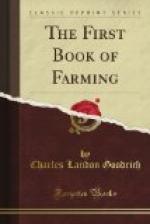How does cotton growing affect soil water?
By wasting humus cotton growing injures soil texture and so weakens the water holding and water pumping power of light soils and weakens the water absorbing power of heavy soils. Therefore the continuous cultivation of cotton weakens the power of the soil over water, that most important factor in crop growth.
How does cotton growing affect soil ventilation?
Continuous cotton culture, by wasting humus, injures texture and therefore injures soil ventilation, causing too much ventilation in the lighter soils and too little in heavier soils.
How does cotton culture affect plant food in the soil?
Continuous cotton growing wastes plant food:
Because it wastes organic matter which contains valuable plant food, particularly nitrogen.
Because by wasting organic matter it increases the leaching of the lighter soils and the surface washing of the heavier soils.
Because its roots occupy largely the upper soil and do not make use of much food from the lower soil.
Because it grows only during the warm part of the year and there is no crop on the land to check loss of plant food from leaching and surface wash during the winter.
Because it is a weak feeder of phosphoric acid, and can use only that which is in the most available form. In applying fertilizer to cotton it is necessary for best results to apply at least twice as much phosphoric acid as the crop can use, because it can use only that which is in the most available form and the remainder is left in the soil unused.
Continuous cotton culture then has an injurious effect on all the important soil conditions necessary to its best growth and development, and the result is a diminishing yield or an increasing cost in maintaining fertility by the use of fertilizer.
How does continuous cotton culture affect the economics of the farm?
The injury to the soil conditions necessary to root growth diminishes the yield and therefore increases the cost of production.
The poor soil conditions tend not only to diminish yield but also to diminish the quality of the crop, which tends to lower the price received for the cotton.
Keeping the land constantly in cotton tends to increase the insect enemies and the diseases of the crop.
The continuous growing of cotton does not permit the constant employment of one set of laborers throughout the year.
The continuous growing of cotton generally means that most of the farm goes into cotton. A small patch of corn is planted for the stock, which are apt to suffer from a lack of variety in food.
The same is true with reference to home supplies. Very few vegetables are grown for the table and there is little milk, butter or eggs for home use or exchange for groceries or drygoods at the store.
Thus we see that the continuous growing of cotton on the soil, year after year, has a bad effect on conditions necessary to its best growth and development and also on the economics of the farm.




